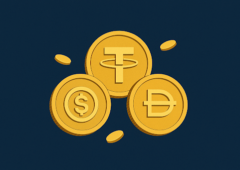South Korea Blocks Unregistered Crypto Apps on Apple and Google Stores
16.04.2025 12:00 1 min. read Alexander Stefanov
South Korea has taken another firm step in its crackdown on unregistered crypto platforms, this time targeting apps available to Apple users.
The nation’s Financial Intelligence Unit (FIU), under the Financial Services Commission, recently ordered the removal of 14 crypto-related applications from the App Store.
These apps were reportedly operated by overseas crypto exchanges, including names like KuCoin and MEXC, that had not received the required local approval.
This move follows a similar enforcement effort in March, when the FIU worked with Google to remove 17 crypto apps from the Play Store for the same reason—lack of registration.
In South Korea, any virtual asset service provider (VASP) hoping to offer services to local users must officially register with the FIU and comply with strict financial reporting laws. Violating these rules can lead to fines reaching 50 million won (about $37,000) or even up to five years behind bars.
Authorities say these removals are part of a broader effort to shut down unauthorized operations, reduce the risk of financial crimes like money laundering, and safeguard retail investors.
With both major app stores now involved, South Korea is sending a clear message: crypto platforms that ignore local compliance rules won’t be given access to the country’s digital marketplace.
-
1
Trump Imposes 50% Tariff on Brazil: Political Tensions and Censorship at the Center
10.07.2025 7:00 2 min. read -
2
Key Crypto Events to Watch in the Next Months
20.07.2025 22:00 2 min. read -
3
USA Imposes Tariffs on Multiple Countries: How the Crypto Market Could React
08.07.2025 8:30 2 min. read -
4
UAE Regulators Dismiss Toncoin Residency Rumors
07.07.2025 11:12 2 min. read -
5
Ripple Selects BNY Mellon as Custodian for RLUSD Stablecoin Reserves
09.07.2025 15:28 2 min. read
Two Upcoming Decisions Could Shake Crypto Markets This Week
The final days of July could bring critical developments that reshape investor sentiment and influence the next leg of the crypto market’s trend.
Winklevoss Slams JPMorgan for Blocking Gemini’s Banking Access
Tyler Winklevoss, co-founder of crypto exchange Gemini, has accused JPMorgan of retaliating against the platform by freezing its effort to restore banking services.
Robert Kiyosaki Warns: ETFs Aren’t The Real Thing
Renowned author and financial educator Robert Kiyosaki has issued a word of caution to everyday investors relying too heavily on exchange-traded funds (ETFs).
Bitwise CIO: The Four-Year Crypto Cycle is Breaking Down
The classic four-year crypto market cycle—long driven by Bitcoin halvings and boom-bust investor behavior—is losing relevance, according to Bitwise CIO Matt Hougan.
-
1
Trump Imposes 50% Tariff on Brazil: Political Tensions and Censorship at the Center
10.07.2025 7:00 2 min. read -
2
Key Crypto Events to Watch in the Next Months
20.07.2025 22:00 2 min. read -
3
USA Imposes Tariffs on Multiple Countries: How the Crypto Market Could React
08.07.2025 8:30 2 min. read -
4
UAE Regulators Dismiss Toncoin Residency Rumors
07.07.2025 11:12 2 min. read -
5
Ripple Selects BNY Mellon as Custodian for RLUSD Stablecoin Reserves
09.07.2025 15:28 2 min. read


